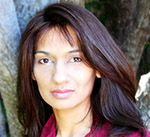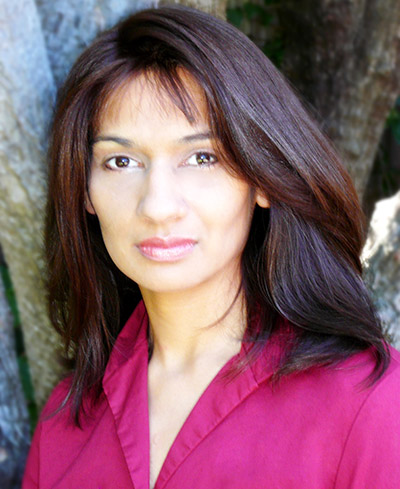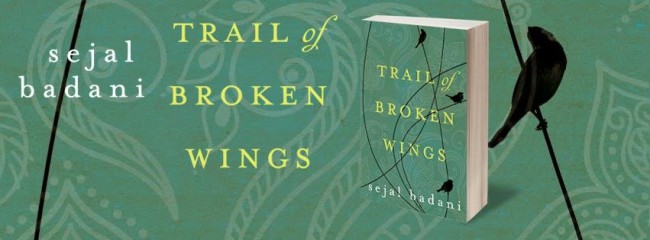Indian-American author Sejal Badani has had a dream literary debut. Her recently released novel Trail of Broken Wings was selected in the Kindle First Program, and quickly became an Amazon #1 bestseller.
Trail of Broken Wings is the story of three daughters raised in domestic violence, trying to heal after years of burying secrets. It is also a story of human resilience, the bonds of family and the strength of women.
In an interview with NRI Pulse, Sejal talks about her journey as a writer, and about the story she never wanted to tell but knew she had to.
What has the journey been like, from writing the first draft of the novel to publication? How long did it take you to write the book?
It has really been incredible. I wrote the first draft of the novel in 8 months working alongside my wonderful copy editor, Benee and then it went to my agent and the publishing house. A year after the contract was signed the book was released. My experience with my literary editor Danielle and the author team at the house has been amazing. They are a truly wonderful group of people who have made the experience a dream come true. From edits to change of title to the cover and finally publication – at every step they have been supportive, collaborative, inspiring and professional. After having been a struggling writer for so many years, I am incredibly grateful.
Did you have to face rejection from agents and publishers, like most authors?
Absolutely and let me tell you it is really no fun! I joke that I could wallpaper my house five times over with all the rejection letters I’ve received over the years. I was formerly an attorney but left the law when my son was born to start writing seriously. Since then I’ve written screenplays, short stories, novels and plays. I’ve won numerous awards for my writings but oftentimes it felt like one step forward and two steps back. But writing is what I love, so the journey has been more than worth it. I think writing, like so many creative endeavors, is something you have to do from your heart and then hope for the stars to align. When they do it’s an incredible feeling.
The novel shifts perspectives, and moves back and forth in time. Did you have a definite framework for your story when you started writing or did the characters and their experiences develop as you went along?
Trail of Broken Wings is a story that has been in my head for years so the pieces fell together over time. It was important for me to tell the characters’ story in the present, but to reveal each sister fully I had to delve into their backstory. It was a careful balance of giving insight into their past without dwelling on the violence. I wanted this story to be about surviving abuse, finding your true self outside the frame of violence.
The four protagonists of your novel carry the burden of secrets all their lives and feel liberated after confronting them and speaking out. Do you, as an author, feel the same sense of liberation after telling the story that was inside you?
This was actually the story I never wanted to tell but knew I had to. It was the story I searched for as a young adult and never found. I remember mentioning it to my editor Benee as an option and then giving her three other ideas but she kept coming back to this one – she really encouraged me to write it. I struggled with the thought of writing it. Once I started, the writing flowed easily. When it was finished, I sighed in relief that the story was finished but also really pleased that the characters’ stories were honest and inspiring.
What was the process of writing like? Cathartic, difficult, calming? Did you discover something about yourself during the process?
Honestly I think it was all three simultaneously – cathartic, difficult and calming. J The characters came alive very quickly in my head and their individual stories demanded to be told. There were many times I would be crying as I wrote, only to be amazed at what was on the computer when I read it afterwards. Other times I struggled with their heartbreak and wanted to step back – give them immediate happiness or lighten their load — but I knew that wouldn’t be true to their story. After writing the scene where Sonya goes to the bar because she is unable to accept David’s love, I had to take a break for a few days. You have this strong, kind woman who is struggling to move past the events of her past and almost loses herself along the way. It was heartbreaking. As the characters neared their resolutions and started to unveil their secrets, I was excited because I knew each one of them, in their own way, had started to heal.
In terms of discovering something about myself during the process, I started my journey of healing a number of years back so the story brought up a number of emotions that I had worked through. It was gratifying to realize I had taken steps forward but also drove home how important it is to process and find healing within yourself. The research for the story – all the personal accounts I read and heard – left me in awe of the courage and resilience of the human spirit.
It is said that most first novels are at least in some part autobiographical. Do you see a little bit of yourself in the protagonists of the novel? Are there parallels with your life story?
Unfortunately I was raised in a home with domestic violence so some of the emotions and struggles that the characters faced were very real to me. I am one of three sisters also and our mom is really our hero. She had few options while we were growing up, but she persevered and forged a path for her daughters. The greatest gift she gave us was reminding us that our past doesn’t define us and how important it is to carve our own place in the world. She really made us believe in ourselves in spite of our upbringing. We are stronger because of her and I’m so thankful for the close relationship my sisters and I have with her and one another.
How connected are you with your Indian roots?
I was born in India and immigrated to the US when I was two. We lived in a university town so there were a number of Indian families in the community and a very strong and active Samaj. Every weekend there would be some type of gathering at a house or in the park. We primarily spoke Indian at home and had Indian meals most nights. I really value that connection with my heritage and appreciate all the beauty and history of our culture. I’ve tried to give my children the same appreciation and values that I have. It is a wonderful feeling to have that connection to our roots.
Some incidents in the book might seem a bit melodramatic. Having grown up on a staple of Bollywood movies myself, I seek melodrama in the books I read. Would you say that the popular culture of India may have shaped your writing in some way?
Unfortunately overcoming abuse is something that is heart-wrenching and can be a never ending struggle against memories and self-doubt. In my research for the book, I read hundreds of real life accounts of both women and men who fight every day just to live a normal life that others take for granted. Countless number of readers who are abuse survivors have commented that the sisters’ struggles in the book remind them of their own past and of their own path to healing. It’s truly heart breaking to realize the long-term effects of abuse on its victims. I absolutely love Bollywood and grew up watching Bollywood movies. I’m especially heartened to see that within the movies and popular culture of India, there is increased discussion of a topic that for so long has remained taboo.
While the novel is essentially an Indian-American story, it provides many insights into Indian culture. Did you have to do considerable research to get the facts right?
Due to how I was raised and the strong connection my family retained with the Indian community, I was able to draw on those experiences and examples. I’ve moved around quite a bit in adulthood and have found that no matter where we live, a common thread that runs through each Indian community is the love of gatherings. That is very comforting! Diwali and Navaratri are my favorite times of year. I love getting dressed up in my best Indian clothes and dancing late into the night. We usually have Indian food a few times a week at home – I’m addicted to the taste and smells of the food I grew up with. Plus living in the Bay Area gives us many tasty Indian restaurant options to choose from, so we’re definitely spoiled.
How much of Brent, the father, is based on a real life character? While the three daughters have Indian names that could pass as American names (Marin, Trisha, Sonya), the father, who is from rural Gujarat, has a very western name. Was this a conscious decision?
Brent was a composite drawn from my extensive research on abuse situations. Naming him Brent was very much a conscious decision. Though the story is set within an Indian-American home, it was very important to me that readers recognize that abuse is not limited to any race, class or culture. Giving him a Western name allowed me to give the characters a more universal feel whilst retaining the integrity of a story set within an Indian-American home.
The instant success of the Trail of Broken Wings is something most authors can only dream of. Did you ever foresee this kind of success? What do you attribute the success of the book to? How has your family reacted to the book and its success?
I am very fortunate to have an incredible support group, including my agent, my editor Benee, Danielle and the author-team at my publishing house and an amazing publicity team at BookSparks – all who have championed the book.
I think the book resonates on different levels with readers. It deals with an incredibly dark subject but the main focus areas of the story are human resilience, the bonds of family and the strength of women. I love the idea of super heroes but Trail of Broken Wings shows that the true hero is within each of us and I think readers draw hope from that thought.
In terms of my family, they are thrilled for me. They have always stood by me and encouraged me to follow my dreams. My sister Hema and my husband read every draft of everything I’ve ever written, so they have been alongside me every step of the journey. I’m indebted to them and my mom and children for their unwavering support. I honestly couldn’t have done it without all of them.
What is Sejal the person like?
I am immensely grateful to be a mother, wife, daughter and sister. At my core I’m a writer and that’s what I love to do. I’m so thankful that I have had the opportunity to tell this story. For there to be the possibility that it even helps one person on their own path to healing is incredibly gratifying.
Is your next novel brewing inside you?
I’m actually working on two novels simultaneously so that’s kept me busy. The first one is about a modern day Indian-American woman who returns to India to discover her grandmother’s legacy in the 1940’s – it’s an epic story that spans generations. The next novel is a young adult series set in a dystopian future after life as we know it has been forever changed by war. They are very different from one another but both have been a lot of fun to write.
Who are your favorite authors? How have they influenced your writing?
I loved The Joy Luck Club when it first came out and of course Jhumpa Lahiri is a magnificent writer. I read Jodi Picoult – she is a master at telling the story from different perspectives. To paraphrase Stephen King from his book On Writing – if you want to be a writer then read – a lot. So I have and my writing is better because of the countless number of talented authors whom I admire and have learnt from.
Would you like to see your novel adapted for the big screen?
My first break into the writing world were two screenplays that won numerous awards, so I am definitely a huge fan of the big screen and love all the amazing adaptations of books that have been done in recent years. It would absolutely be a dream come true to see Trail of Broken Wings adapted for the big screen.







